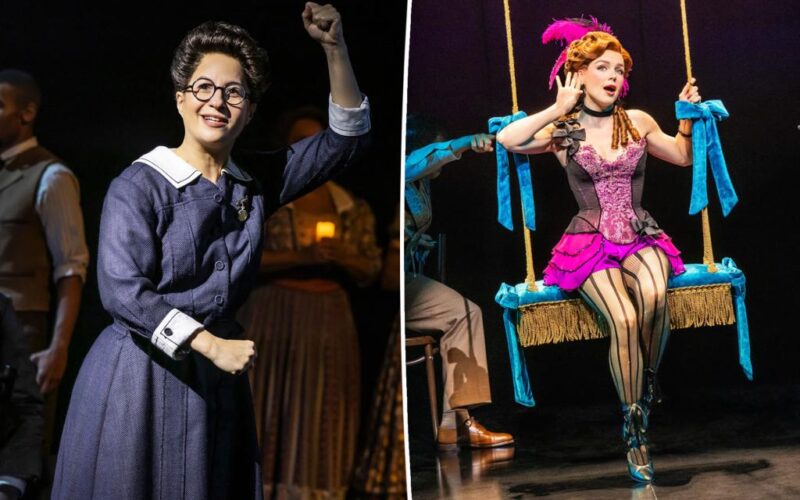Theater review
RAGTIME
2 hours and 45 minutes, with one intermission. At the Vivian Beaumont Theater, 150 W. 65th St.
When massive musicals are downsized, the typical argument in favor of the choice is that fewer sets and dazzling doodads put the focus squarely on the music, lyrics and story.
That’s certainly true of the latest revival of “Ragtime,” formerly a behemoth of an American history show, which opened Thursday night at the Vivian Beaumont Theater.
Only the effect this time, much like the Ford Model T featured in it, goes in reverse: Stripping away the excesses of Lynn Ahrens, Stephen Flaherty and Terrence McNally’s 1996 musical amplifies its many, many flaws.
A hefty chunk of the complicated plot — about the turbulent convergence of whites, blacks and European immigrants in New York state around the turn of the 20th century — is conveyed through hokey, animatronic, boilerplate narration that goes in one ear and out the other.
Some more scenery would help clarify what’s going on.
Its score is largely elevated merry-go-round tunes. But the best songs, the anthemic “Wheels of a Dream,” “Back to Before” and “Make Them Hear You,” which can be so rousing as concert stand-alones, are vague and generically sadspirational (“Go out and tell our story! Let it echo far and wide!”) when sung back to back with little to look at but the Beaumont’s vast emptiness. One ballad after another.
And there are so many rapid-fire events in the overstuffed second act — arson, a move to Atlantic City, a cryptic prediction of the assassination of Archduke Franz Ferdinand, a pointless baseball ditty, a film shoot, a brutal tragedy and a borderline comic epilogue in which we matter-of-factly learn almost everyone is dead — that the audience is left with little time to feel anything but whiplash.
All that said, this revival of “Ragtime,” barely directed by Lear deBessonet, goes back to before in one extraordinary area: its stupendous cast.
The original Broadway production in 1998 featured career-changing performances from Brian Stokes Mitchell, Audra McDonald and Marin Mazzie.
Now, in 2025, you feel every bit as fortunate to be basking in the radiant glow of Caissie Levy playing Mother, Ben Levi Ross as Mother’s Younger Brother and especially the golden-voiced Joshua Henry as Harlem piano player Coalhouse Walker. The revival’s power is all in the pipes.
As for the story — well, how long you got?
E.L. Doctorow’s novel that the musical is based on is 270 pages long, and I’d need about that much space to adequately explain his thicket of intertwining characters.
The calm life of a white family in idyllic New Rochelle — Father (Colin Donnell), Mother, Mother’s Younger Brother, Grandfather (Tom Nelis) and Little Boy (Nick Barrington) — is shaken up when a black baby is discovered abandoned in their garden.
He’s the son of Sarah (Nichelle Lewis), the spurned ex of Coalhouse, whom she’ll no longer speak to.
As the once-philandering Coalhouse tries to win Sarah back, Mother controversially decides the silent woman and her infant boy will move in upstairs.
Meanwhile, downstate, Latvian Jewish immigrant Tateh and his daughter attempt to build a prosperous new life on the Lower East Side. But the American dream remains far out of reach for them. Brandon Uranowitz plays Tateh with his usual manic energy and nonstop fidgeting that so often rips me out of his performances.
Tateh’s story, as written, is the weakest thread of all, and even more so now in the wake of the rawer Adrien Brody immigrant movie “The Brutalist.”
The big, diverse crew is messily tossed together, evolving along the way. Indeed, every other line, lest we dare forget, is about how the times, they are a-changin’.
Those core fictional folks meet a cute array of real-life figures: Harry Houdini (Rodd Cyrus), anarchist Emma Goldman (Shaina Taub), Henry Ford (Jason Forbach), J.P. Morgan (John Rapson), Booker T. Washington (John Clay II) and vaudeville actress Evelyn Nesbit (Anna Grace Barlow).
Side dishes, all.
Levy, in one of my favorite performances of hers so far, sings a powerful “Back to Before,” about Mother’s personal about-face. Yet she’s competing with the red fabric that designer David Korins places above her, making it appear as if the actress got swallowed whole by a whale.
Playing her brother, a politically driven explosives expert, Ross is grounded, real and forceful as he defies his antiquated dad. Ross, who starred in “Dear Evan Hansen,” does the best acting in the show, albeit in one of its smaller principal parts. Let’s hope we get to see a lot more of his theatrical fireworks.
Lewis, recently of “The Wiz,” is unfortunately one-note as Sarah, a difficult role to add layers to. Her “Your Daddy’s Son” falls flat. She’s better when standing next to the indomitable Henry, a deep-feeling actor whose singing hits us like a sonic boom of pleasure. He’s been sensational for years, but is finally getting his due here. His Coalhouse has enough fuel to power Manhattan.
If only the whole show were at his level.
“Ragtime,” a music-box nostalgia exercise that really only makes people nostalgic for the 1990s, marks deBessonet’s freshman go as artistic director at Lincoln Center, and her first show in a while to not have an asterisk after it.
Her City Center productions, including an earlier version of “Ragtime,” were staged concerts, and her Public Works projects featured hundreds of community members. Discerning any point of view from them was hard.
It still is. She doesn’t have a mastery of the Beaumont’s huge thrust yet. And so this is an overly presentational staging in which actors other than Ross struggle to connect to one another, which is partly why the experience is mostly unmoving even as songs desperately beg us to cry.
“Ragtime” has never been a musical with a lot of personality, true, but deBessonet’s iteration is especially monochromatic.
Still, her cast sings the hell out of it. Everybody has taken the words “Make Them Hear You” to heart.








